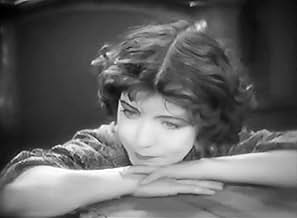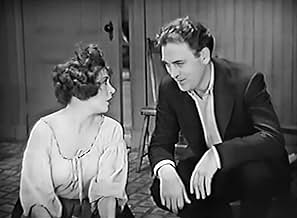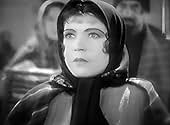Füge eine Handlung in deiner Sprache hinzuA WWI vet takes on the KKK when he loses his wife to a womanizing Klansman.A WWI vet takes on the KKK when he loses his wife to a womanizing Klansman.A WWI vet takes on the KKK when he loses his wife to a womanizing Klansman.
- Regie
- Drehbuch
- Hauptbesetzung
- Auszeichnungen
- 4 wins total
Symona Boniface
- Woman at Welcome-Home Party
- (Nicht genannt)
Delmer Daves
- Undetermined Role
- (Nicht genannt)
Christian J. Frank
- Wife Beater
- (Nicht genannt)
Herman J. Mankiewicz
- Newspaperman
- (Nicht genannt)
Broderick O'Farrell
- Poker Player on Train
- (Nicht genannt)
Frederick Sullivan
- Poker Player with Rabbit's Foot
- (Nicht genannt)
Will Walling
- Uncle Billy - Townsman
- (Nicht genannt)
Empfohlene Bewertungen
A soldier (Thomas Meighan) returns from the war to find that his secret marriage has been annulled and his sweetheart has re-married. That doesn't stop the ex-wife (Evelyn Brent) from directing her attentions toward him while her current husband sees other women. But these associations with a married woman get the soldier in trouble with the local Ku Klux-type Order.
THE MATING CALL (1928) really is a solid silent film. I watched it on a whim and was pleasantly surprised. TCM host Robert Osborne assured viewers that James Cruze was a top-tier director of the silent era, and his direction here is solid. This is one of the rare Howard Hughes- produced silent films that had been considered lost before turning up in Hughes's private collection in recent years. The restoration looks great, the photography crisp and clear.
The lovely Evelyn Brent is terrific as the town belle turned vamp. What a screen presence! I recall seeing her with William Powell in HIGH PRESSURE (1932), but she really makes an impression with this sexy, seductive performance. She has a real charisma on screen. There's also a great scene where a bitter Meighan, unmoved by her advances, forcibly removes Brent from his home as she battles back.
Renée Adorée is very cute as an immigrant girl and reluctant bride. Her sweet and innocent character is in stark contrast to Brent's character and gives the film a love story. There's a scandalous skinny dipping scene, but the distant nudity is innocuous enough.
The masked Order pose a dangerous threat and add a darker drama to the tangled web of small-town romance. The performances and the underlying darkness (including an eerie riverside discovery) raise this movie above other, more soapy melodramas and make THE MATING CALL one to check out.
THE MATING CALL (1928) really is a solid silent film. I watched it on a whim and was pleasantly surprised. TCM host Robert Osborne assured viewers that James Cruze was a top-tier director of the silent era, and his direction here is solid. This is one of the rare Howard Hughes- produced silent films that had been considered lost before turning up in Hughes's private collection in recent years. The restoration looks great, the photography crisp and clear.
The lovely Evelyn Brent is terrific as the town belle turned vamp. What a screen presence! I recall seeing her with William Powell in HIGH PRESSURE (1932), but she really makes an impression with this sexy, seductive performance. She has a real charisma on screen. There's also a great scene where a bitter Meighan, unmoved by her advances, forcibly removes Brent from his home as she battles back.
Renée Adorée is very cute as an immigrant girl and reluctant bride. Her sweet and innocent character is in stark contrast to Brent's character and gives the film a love story. There's a scandalous skinny dipping scene, but the distant nudity is innocuous enough.
The masked Order pose a dangerous threat and add a darker drama to the tangled web of small-town romance. The performances and the underlying darkness (including an eerie riverside discovery) raise this movie above other, more soapy melodramas and make THE MATING CALL one to check out.
Evelyn Brent's depiction of Rose Henderson truly makes me wonder just how
much better films of the thirties, forties, and fifties to mid sixties would have been had not censorship seized control of Amercan cinematography in the early
1930's. Instead of a scene showing Rose and her wealthy husband Lon each in a twin bed separated by a nightstand, The Mating Call has Rose calling on her
ex-husband, Leslie, who has just returned from WWI to find out his marriage to underage Rose was annulled by her parents when he was serving in France.
Rose has no love for her husband, Lon, as he is having an affair with a much
younger woman, and despite Leslie's not wanting to see her again, Rose
repeatedly attempts to seduce him - finally tricking Leslie into joining her in his bedroom after she has begun to disrobe. If TCM runs it again, check it out. It's nice to know that pre-production code movies actually depicted some of the
interesting realities of life that censors wouldn't allow.
much better films of the thirties, forties, and fifties to mid sixties would have been had not censorship seized control of Amercan cinematography in the early
1930's. Instead of a scene showing Rose and her wealthy husband Lon each in a twin bed separated by a nightstand, The Mating Call has Rose calling on her
ex-husband, Leslie, who has just returned from WWI to find out his marriage to underage Rose was annulled by her parents when he was serving in France.
Rose has no love for her husband, Lon, as he is having an affair with a much
younger woman, and despite Leslie's not wanting to see her again, Rose
repeatedly attempts to seduce him - finally tricking Leslie into joining her in his bedroom after she has begun to disrobe. If TCM runs it again, check it out. It's nice to know that pre-production code movies actually depicted some of the
interesting realities of life that censors wouldn't allow.
Leslie Hatten (Thomas Meighan) goes away to fight WW1. He secretly marries beautiful Rose (Evelyn Brent). He returns 2 years later to find their marriage annulled and she's married to Lon (Alan Roscoe). She still wants to sleep with Leslie but he refuses her. However Lon thinks she IS sleeping with him and is a member of The Order--a Ku Klux Klan-like organization who punish everyone they think isn't "moral" enough.
There's more but that's the gist. Fast-moving, pretty racy (Brent flashes some nudity), well-acted and directed drama. It brings up multiple themes--WW1, marriage, adultery, suicide, murder, secret organizations punishing people--and mixes them all up and throws them at the viewer in an entertaining way. This doesn't seem to be making any sort of statement (although it does strongly suggest that The Order is wrong) but just gives the viewer a fast-paced entertaining drama. This was thought to be lost for many years but was discovered and lovingly restored. We should all be happy for that. I give it a 7.
There's more but that's the gist. Fast-moving, pretty racy (Brent flashes some nudity), well-acted and directed drama. It brings up multiple themes--WW1, marriage, adultery, suicide, murder, secret organizations punishing people--and mixes them all up and throws them at the viewer in an entertaining way. This doesn't seem to be making any sort of statement (although it does strongly suggest that The Order is wrong) but just gives the viewer a fast-paced entertaining drama. This was thought to be lost for many years but was discovered and lovingly restored. We should all be happy for that. I give it a 7.
Though the "Order" in the film is not referred to as the KKK, it is obvious who it is supposed to represent. The KKK of the 1910s and 1920s was the second generation of the clan which resurfaced in 1915, with the aid of "Birth of a Nation" The organization still held on to its racist roots and expanded to the anti-immigrant, anti-Jew and anti-catholic views. They relaxed their hatred of the "radical Republicans" to reach out to more white people as long as the Republicans who wished to join developed conservative views. This Era of the Klan was founded on concepts of Americanism, meaning Christianity and Patriotism; it was a White male social and fraternal organization organization out to stomp on "Niggers, Catholics, Jews...dope, bootlegging, graft, night clubs and road houses, violation of the Sabbath, unfair business dealings, sex and scandalous behavior." The organization practically ran Southern governments and appealed to small Northern towns as well. Robert Coughlan in "Konklave in Kokomo" stated "Literally half the town belonged to the Klan when I was a boy. At its peak, which was from 1923 through 1925, the Nathan Hale Den had about five thousand members, out of an able-bodied adult population of ten thousand. With this strength the Klan was able to dominate local politics." So, the portrayal of the clan was not too way off. The clan flogged many a white man and woman for "immoral behavior". I found the movie portrayed the clan in a neutral manner, politically correct for its time, but leaning toward the negative side as a bullying organization meddling into the private affairs of others. We all know that was the least of what they did. In fact, within a year or two of the release of this film, the clan quickly deteriorated from public backlash against the criminal behavior that came with their almost absolute power. On a whole other note, I was amazed at the nudity that was allowed in films back then. It was not prevalent but not new either. Of course this was the roaring 20s with mini-skirts, the Charleston and flappers. This was before the depression. Though I did not find the movie all that worth watching for the story line, looking at it to view the contemporary views that were abundant and conflicting makes this an historical gem.
What a bizarre and fascinating movie, with quite a bit to think about. I won't bother with the plot, except to say it's melodramatic and has some interesting (and pretty unique) turns in its short 72 minute run time. The things which stood out:
These three things were intriguing to me because they each created conflicting feelings. There are no black/white, purely good or bad aspects, certainly by today's standards. I was surprised over what I was seeing and it took time to process it, both in the context of the period as well as how it affected me. The film is not a masterpiece by any means, but these are the kinds of things which fascinate me about old movies.
- The KKK reference. It seems to me a critique of organized thugs who operate outside the law, or in this case, essentially are the law, while at the same time, not wanting to be direct about the racism of the real-life Klan. "The Order" in this film is a large group of armed townsfolk who don hoods and robes at night, then burst into homes and haul people off to answer for behavior they deem unacceptable (with one stated goal being to "safeguard the honor of our womenfolk"). Without any real form of trial where one is presumed innocent, allowed to prepare a defense, etc, victims answer questions put to them by the hooded leader. With a bonfire blazing away in the background, if he deems they're guilty, they're strapped to a giant cross and whipped. It doesn't have the racist persecution of real Klan behavior and is therefore far from an ideal depiction, but it's still a scary vision of the degradation of justice in America, and mob rule. They might seem to dispense justice in a couple of cases, but do they really? We have no idea, there is no trial, and the punishment is cruel and unusual. Aside from flogging people, they operate on hearsay, get things wrong, plant evidence, and arbitrarily decide a murder is OK. I think the critique is consistent with the increased criticism of the Klan in the mid to late 1920's, and its associated decrease in power.
- The sex. Producer Howard Hughes apparently wanted to push boundaries, and he and director James Cruze certainly did. Evelyn Brent is quite steamy as she attempts to seduce Thomas Meighan in a couple of scenes. In one she feigns an accident and pours a tub of water over her dress so that she has to change in his bedroom. In another she stands behind him, cheek pressed into his back, and fondling his hand in what seems like a reference to his manhood. Her eyes are so beguiling and she has just one thing on her mind for most of her time on the screen. Later Renée Adorée takes a nude swim, and then pads around in a wet, clinging nightgown. Helen Foster plays a beautiful young girl who is having an affair with a married man (Alan Roscoe), one of many for him, and what sets his wife (Brent) out to "follow his example." The film objectifies women and puts them into the usual buckets (temptress, virtuous, ruined), but it also points out the double standard.
- The transactional view of marriage. When Meighan's character wants to get married ASAP he simply goes out to Ellis Island and makes a bargain with an immigrant family, who won't be let into America otherwise. (This is where Adorée comes in). He simply states that he needs a wife to help work on his farm, and after some heated sidebar discussion, they young woman and her parents agree. The two know nothing about each other. The power imbalance and the idea of essentially a mail-order bride is disturbing to me, but they don't seem upset by it, and it just seems like a business transaction to them. Is it horrifying, or is a part of this more honest than many marriages? Is it a reflection of the times despite being a plot artifice, because of its practicality and the speed with which they get married (just as he was quickly married to Brent's character earlier)? Maybe all of the above. Regardless, she presents herself to him that night, knowing that's part of her 'obligations' (he demurs), makes a big breakfast for him the next morning, and soon we see her on all fours scrubbing the floor. The relationship grows to include some tenderness and signs of affection, including an amusing scene where Adorée pretty expertly scrubs down a pig and he joins her (why the pig needs to be washed, we have no idea). It seems a positive view of what is a strange marriage.
These three things were intriguing to me because they each created conflicting feelings. There are no black/white, purely good or bad aspects, certainly by today's standards. I was surprised over what I was seeing and it took time to process it, both in the context of the period as well as how it affected me. The film is not a masterpiece by any means, but these are the kinds of things which fascinate me about old movies.
Wusstest du schon
- WissenswertesLong thought to be lost, a print was discovered in the Howard Hughes collection at the University of Nevada, Las Vegas.
- PatzerAlthough the story takes place immediately after World War I (1918-1919), all of Evelyn Brent's and Helen Foster's clothes are strictly in the 1928 short skirt mode, completely out of place in the time frame of the story.
- Zitate
Poker Player: Major Hatten seems to be suffering from shell shock.
Hatten's Best Man: Worse than that! He's in love - with his own wife.
- Alternative VersionenIn 2004, the University of Nevada Las Vegas and Flicker Alley, LLC copyrighted a digitally restored version with a new orchestral score composed, arranged and conducted by Robert Israel. It was produced by Jeffery Masino and runs 72 minutes.
- VerbindungenReferences The Sky Rider (1928)
Top-Auswahl
Melde dich zum Bewerten an und greife auf die Watchlist für personalisierte Empfehlungen zu.
Details
- Erscheinungsdatum
- Herkunftsland
- Sprachen
- Auch bekannt als
- Mating Call
- Drehorte
- General Service Studios - 1040 N. Las Palmas, Hollywood, Los Angeles, Kalifornien, USA(studio - known as Metropolitan Studios at the time)
- Produktionsfirma
- Weitere beteiligte Unternehmen bei IMDbPro anzeigen
Box Office
- Budget
- 400.000 $ (geschätzt)
- Laufzeit1 Stunde 12 Minuten
- Farbe
- Sound-Mix
- Seitenverhältnis
- 1.33 : 1
Zu dieser Seite beitragen
Bearbeitung vorschlagen oder fehlenden Inhalt hinzufügen


































